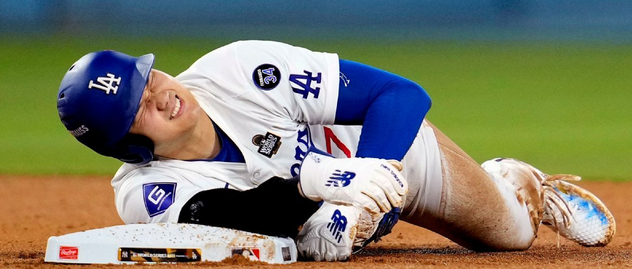Shohei Ohtani Career On The Line After……

In the world of baseball, there are few athletes who can grip the hearts of fans worldwide like Shohei Ohtani. As a generational talent, Ohtani doesn’t just play the game—he transcends it, leaving fans, critics, and teammates in awe of his remarkable skill, fierce dedication, and undeniable charisma. When news of his shoulder injury broke, a collective gasp could be heard around the baseball world. Ohtani’s presence on the field isn’t just a bonus; it’s an experience. So, when reports surfaced that he would return for Game 3 of the World Series, fans felt a complex mix of relief and worry: Is it too soon?
As the World Series unfolded, Ohtani’s injury lingered in the background, a cloud hanging over his team’s aspirations and his career-defining season. But despite the odds, the bittersweet news of his return for Game 3 made headlines. It’s the comeback everyone wants—but with a catch. Yes, Ohtani will step back onto the field, but what will it cost him, and what risks will his team face?
This season, Ohtani has proven his value countless times. As one of the rare few who can pitch and hit with elite skill, he has shattered records, pushing boundaries on what it means to be a baseball player. But his season hasn’t been without challenges. His shoulder injury is not just a bump in the road; it’s a potential threat to his extraordinary dual role in baseball. Coming back too soon could have consequences that extend beyond this season, making his decision to return both inspiring and unnerving.
It’s hard not to admire his courage. For Ohtani, this is more than just a game; it’s his legacy. His decision to play despite the risks speaks volumes about his commitment to his team and the sport. Yet, as fans cheer him on, there’s a shared understanding of the vulnerability he faces—one that puts the thrill of the game in a different light.
As fans, we live for these moments. The rush of seeing our favorite players overcome adversity, defying the odds, is part of what makes sports so captivating. Yet, this is not just any player; this is Shohei Ohtani. The stakes feel higher, and the potential for heartbreak looms larger. No one wants to see a beloved player’s career compromised by a single game or a single decision.
In the days leading up to Game 3, fan forums and social media have been buzzing with mixed emotions. There’s joy in seeing their hero back in action, but it’s tainted with a feeling of caution. No one wants Ohtani to push himself past the point of no return.
This situation brings forward a powerful question that fans, teams, and players alike often face: How much is too much? In sports, the line between greatness and self-sacrifice is thin. For Ohtani, Game 3 may be an opportunity to cement his legacy, but at what cost? A shoulder injury can be tricky to manage, especially for a player with Ohtani’s versatility. Is the chance to bring home a World Series victory worth the potential long-term consequences?
Ohtani’s decision to return reflects the timeless narrative of the hero who sacrifices for the greater good. But in this story, there’s a plot twist we can’t ignore: the very thing that makes him extraordinary—his willingness to push himself—is also what puts him at risk.
As Game 3 approaches, fans will be on the edge of their seats, experiencing a rollercoaster of emotions. Ohtani’s return is undoubtedly exciting, but it’s the kind of excitement tinged with fear. We may witness greatness, but it’s a moment we’ll watch through slightly parted fingers, hoping for the best but bracing for the worst.
Whatever the outcome, Shohei Ohtani’s journey is one that inspires and challenges us. He reminds us of the courage it takes to pursue greatness, even when the odds are steep. For now, we’ll hold our breath, wishing for a triumphant return that brings nothing but victory and a future full of promise.
